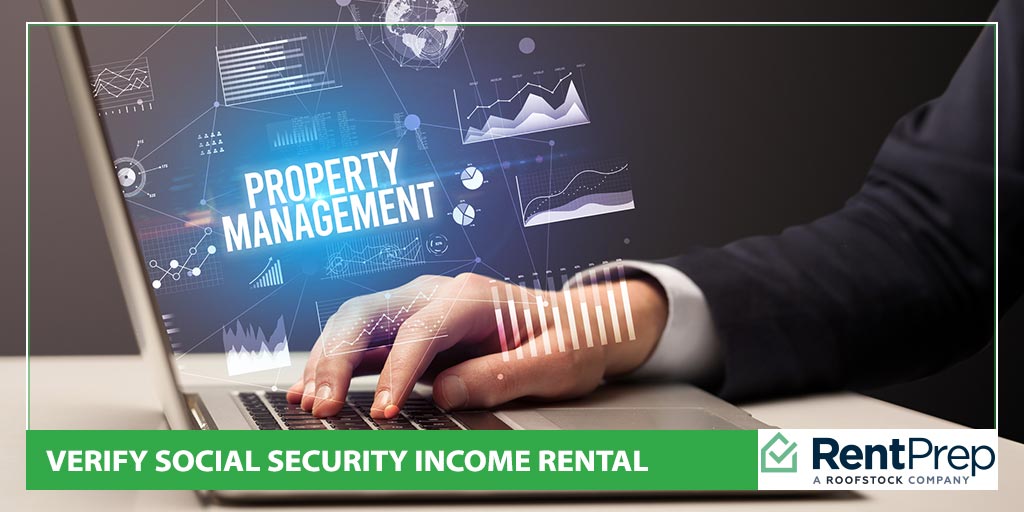
To be a successful landlord and property manager, you need to be filling your properties with the tenants that fit best. Often, this means ensuring that the tenants can afford to rent your unit. Though you may not have done this before, you may need to verify the Social Security income of rental applicants.
Nonpayment of rent can lead to big issues for you and for your future tenant, and neither party should end up in that situation if it can be avoided. As the landlord, you have the opportunity to slow down, verify income, and ensure that a particular rental agreement would be a good financial move for you.
If you skip this step, you could end up needing to evict a tenant for nonpayment of rent, and this is a very costly process. On average, evictions cost landlords at least $1,000 minimum, and they often cost a lot more.
Learning how to verify different types of income to avoid the hassle of eviction is an essential landlord skill. Today, learn how to verify SSI income the right way.
Table Of Contents: How To Verify Social Security Income For Rentals
Knowing how tenants can request and submit proof of Social Security income is important; some potential tenants may be unsure how to do this. This guide will ensure that you can help:
- Why Proof Of Income For Apartment Applicants Matters
- What Is An Income Verification Form?
- How To Verify Social Security Income Or SSI Income For Your Rental
- Securing Your Rental Properties With Tenant Screening
- FAQs: Verifying Tenant Income
- Remember: Get Proof Of Income For Rental Applicants
Why Proof Of Income For Apartment Applicants Matters

Tenant screening is a process that includes many steps, and one of the most important is to verify the tenant’s reported income. New landlords who don’t have a lot of experience choosing tenants may not fully grasp the importance of this step, but why does it matter so much?
Tenants who don’t make enough monthly income to comfortably cover the rent on top of their other expenses are more likely to pay late or miss rent payments than other applicants. If a tenant cannot easily make rent each month, they may fall behind, which could even lead to an eviction situation.
Verifying income is just another part of the process of choosing the best tenant for your property. Alongside credit checks, references, and rental history, having all of this information will make it easier to make the right decisions.
Screening tenants thoroughly, which includes verifying two or three income sources, is time-consuming, but the time investment will pay off. You want to be sure the tenant is not lying or trying to hide anything about their finances, as this is a big red flag. Take time to do this right, and you’ll have less to worry about long-term.
Understanding The Rent-To-Income Standard
Many landlords who learn how to verify different types of income do not understand what the correct rent-to-income ratio is for their property. In the rental industry, the standard ratio is 3:1 income to rent. Essentially, this means that a tenant’s monthly income should be at least three times the rent.
If you’re considering a tenant applicant, you should have a rent-to-income standard in place. However, the ideal ratio will vary from market to market. Large cities with high rent averages, such as New York City, will see tenants frequently spending nearly two-thirds of their income on rent.
Consider what type of rent-to-income ratio makes sense for your region and property. Then, verify applicant incomes to ensure that all prospective tenants reach that standard. If they do not, it may be best to go with another choice.
Don’t forget that you must accept all forms of lawful income, but that might leave you wondering how to verify Social Security income, Supplemental Security Income (SSI), or Social Security Disability Insurance (SSDI) for your rental.
What Is An Income Verification Form?
How do you actually go about verifying the income of a potential tenant?
In most cases, you’ll want to use a type of income verification form. Income verification letters don’t always follow a standard outline, but they act as a form of proof of what the tenant is earning monthly or annually. These letters can come from an employer, court, bank, or the Social Security Administration, depending on what type of income the tenant has.
For example, a tenant who receives a court-mandated payout each month may have a verification letter from the court to show you. Additionally, some tenants may use tax forms, pay stubs, or bank statements as their verification.
How To Verify Social Security Income Or SSI Income For Your Rental
Though many renters received SSI or SSDI benefits, not everyone is familiar with how to access the necessary documents to verify this income. As a landlord, learning how to access this information will help you guide prospective tenants so that you can verify their income more quickly. Time is money in the rental industry, so it’s a great skill to learn.
All rental applicants with SSI or Social Security Disability Insurance (SSDI) can request what is called a “benefit verification letter.”
This letter is sometimes referred to as the following:
- Social Security Budget letter
- Social Security Benefits letter
- Social Security Proof of Income letter
- Social Security Proof of Award letter
The fastest way for beneficiaries to request and receive a benefit verification letter is to set up or sign in to their account online. Once logged in, prospective tenants can quickly and easily obtain their letters online.
The official letters that beneficiaries can retrieve from the online portal include the following information:
- Income (for loan and mortgage applications)
- Income (for housing, state, and local benefits)
- Health insurance coverage, if applicable
- Retirement status
- Disability
- Age
The only information you need from this document is the income verification portion, but the document may include additional information beyond that figure.
Remember, you can only use certain information when making decisions about whom to rent to. Do not use any protected class information when making your decision.
Verify Proof Of Social Security Income By Phone
If your applicant does not have online access, they can call 1-800-772-1213 where they can request a letter in the mail.
I called the number to see what would happen. The automation instructs you to say what you’re calling about and go through a bunch of prompts from there.
Here are the prompts to which I gave voice responses up to the point of entering my Social Security number.
- “Benefit Verification Letter”
- “Yes”
- “Proof of Income”
- “Continue”
- “Yes” (agree to terms)
I was then prompted to enter my Social Security number one digit at a time
At this point, I dropped off the call because I do not currently have any Social Security income.
From what I gather, the tenant applicant would need to answer another income verification question before being patched through to get a benefit verification letter.
Once they have this verification letter, they can share it with the landlord.
Can’t Verify SSI Income?
If, as the landlord, you’re in a pinch, you can also ask to see 90 days of bank statements from an applicant rather than waiting for their benefits letter.
SSI benefits are paid on the first of the month. Unless the first falls on the weekend, the payments will be issued the Friday before the first.
You should be able to see a recurring payment on their bank statements towards the first of the month and get a sense of how that will play into their overall income.
Remember, however, that any tenant who shows reluctance to share their financial information with you may be trying to hide something. While some tenants may genuinely have trouble getting the SSI documentation, most should be able to do so with relative ease.
Income Verification Protections: Check Local Laws
As a landlord considering tenant applicants, you must be sure that you are not using any protected class of information to make your tenant screening decisions.
As of right now, sources of income are not considered a protected class under the FHA. However, your local state or locality can add more protections. It’s always a good idea to keep up to date with your local laws.
Securing Your Rental Properties With Tenant Screening

Learning more about how to verify SSI income and other types of non-standard income is an important part of your success as a landlord. Not verifying a potential tenant’s income could mean they will be unable to pay rent in just a few months, even though you expect a full-term lease to play out.
Without going through the proper tenant screening processes, you could be unknowingly setting yourself up for a costly, time-consuming situation.
One of the best ways to complete tenant screening is to use a qualified tenant screening service. Services like RentPrep give you clear information and do not include information that cannot be used when screening tenants, making the overall process much simpler for landlords.
FAQs: Verifying Tenant Income
What is proof of income?
Landlords use a document known as proof of income, which allows them to confirm the average earnings of a prospective tenant. Landlords use this information to make sure the tenant can cover the monthly rent, and it is a great way to screen tenants to ensure they aren’t renting to an unprepared tenant.
In some cases, you may want to request more than one type of verification. For example, prospective tenants who receive weekly payments but can only provide a few stubs should also be asked to provide an employer verification letter. This letter will show you that the tenant is employed long-term and that these payments will continue for the foreseeable future.
Some types of income proof might be out of the realm of what you are used to seeing, but that doesn’t make those types of income less worthy. For example, freelancers may need to provide 1099s and bank statements rather than an employer verification letter because they work with a variety of clients.
Review each document carefully, and be sure to follow all local rules when determining tenant eligibility based on income.
Does SSI count as income for an apartment?
When applying for an apartment, landlords should consider SSI benefits as part of their tenant’s income as long as they are long-term, recurrent payments. SSI benefits of all types are legal types of income, which means that landlords are typically required to accept them.
It is crucial for landlords to be familiar with SSI and SSDI income and how these payments work. Otherwise, you could be excluding great potential tenants. As long as you see proof of benefits from tenants who receive SSI, this income should be considered valid when reviewing their rental application.
Additionally, many states prohibit landlords from discriminating against tenants due to the type of income they receive. Be sure that you are familiar with your state’s laws before refusing to accept a certain type of income so that you do not accidentally violate any important rules.
These protections exist to safeguard tenants from unreasonable judgment or discrimination, and the penalties for disregarding the rules can be quite severe.
Is an SSI check amount based on income?
Social Security benefits are based on your lifetime earnings rather than on what you are currently earning. Earnings are adjusted to average out wages, and then you receive a set amount for each check. The amount may differ from year to year if the calculation method changes or things are adjusted for inflation.
Depending on the specific type of benefit, income may play a factor in what is received. Disability benefits, for example, are typically limited to those who make below a certain income. To better understand what is received, tenants with questions about their income benefits should reach out to Social Security directly.
How does social security work in the US?
Our current Social Security system is structured so that when you are employed, you automatically pay taxes into Social Security. This money is then redistributed by Social Security to the following individuals:
- People who have retired
- Disabled individuals
- Survivors of workers who have died
- Dependents of beneficiaries
You pay Social Security taxes based on your income earnings up to a certain amount.
The Social Security Administration says the following about your Social Security number:
Your link with Social Security is your Social Security number. You need it to get a job and pay taxes. We use your Social Security number to track your earnings while you’re working and your benefits after you’re getting Social Security.
In a separate article, the SSA lays out the differences between Social Security taxes based on working for an employer or those when self-employed:
If you work for an employer, you and your employer each pay a 6.2 percent Social Security tax on up to $127,200 of your earnings and a 1.45 percent Medicare tax on all earnings.
If you’re self-employed, you pay the combined employee and employer amount, which is a 12.4 percent Social Security tax on up to $127,200 of your net earnings and a 2.9 percent Medicare tax on your entire net earnings.”
As you can see, the overall Social Security and benefits process is complicated, and knowing exactly what your rental applicants are receiving may at first seem confusing. That’s why it is so important to receive their benefits verification letter when possible.
By learning how to access this letter, you can share this information with applicants so they can choose to receive and share the letter with you. The income information provided will help you make the right choice when screening your tenants.
What are the most common ways to verify a tenant’s income?
You know how important it is to make sure that you can verify a tenant’s income, but how do landlords typically do this? Not all tenants will be receiving SSI, so you want to get familiar with the various ways to verify income.
These are the most common ways to check that a tenant’s income will suit your rental property:
- 1040 tax return
- Pay stubs
- Bank statements
- Previous years’ W-2s
- 1099 form
- Income verification letter from an employer
- Social Security benefits statement or verification letter
In most cases, tenants will be able to provide at least one of these methods of verification. If they show hesitation in providing some type of verification document, they may not have the funds necessary to rent your property. Make sure you verify all prospective tenants’ income before you make a final decision about who to rent to.
Can tenants have more than one type of income?
Some landlords may be surprised when a tenant has one, two, or even three or more primary income streams. Remember, however, that everyone has a different life setup. It is not uncommon for people to have multiple sources of income. Sometimes, income isn’t always what you imagine it to be.
For example, a single mother who applies to rent your property may provide a court letter that shows she is receiving court-mandated child support benefits. These benefits are a type of income that can typically be used on rent as it directly supports housing the child.
Some potential tenants may be contractors or freelancers who work for a variety of clients or on various projects at one time, which can lead to a less traditional income verification process. Remember to be open-minded about this when considering the income while also verifying it carefully.
Remember: Get Proof Of Income For Rental Applicants
Choosing the right tenants to occupy your rental properties is key to having a successful rental business. Great tenants will keep the property in good condition, communicate well, and pay rent on time.
One of the most important parts of screening when choosing prospective tenants is verifying their income to ensure they can afford the property. Tenants who don’t make enough annually to cover the rent will not keep up with payments, putting both parties in a challenging situation.
Obtaining proof of income through a Social Security Benefits letter or another means is a way to protect you and your future tenants from ending up in a strained financial situation. Make sure not to skip this step when making your selection.

